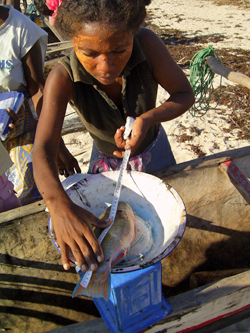LMMAs

Local Malagasy women monitors fish catch. Photo © Anne Furr/Marine Photobank
A locally managed marine area (LMMA) is an area of nearshore waters and its associated coastal and marine resources that is managed at the local level by communities, land-owning groups, partner organizations, and/or collaborative governments who reside or are based in the immediate area.
A locally managed area can vary widely in purpose and design but two aspects remain consistent among them:
- A well-defined or designated area
- Involvement of communities and/or local governments in decision-making and implementation
An LMMA differs from a conventional MPA in that locally managed areas are characterized by local ownership, use and/or control, and in some areas follow the traditional tenure and management practices of the region. By contrast, the term MPA normally refers to an area formally designated via a top-down governmental approach, with management implemented or overseen by a centralized agency.
Communities typically set aside at least part of a locally managed area as a no-take reserve (i.e., an LMMA can use MPAs as one of the tools for management) or impose certain gear, species, or seasonal restrictions to allow habitat and resources to recover from fishing pressure, or to sustain or increase fish catch.
As part of a locally managed area, some communities revive traditional practices that have been used as part of their culture for many generations. Others use modern ideas introduced from external sources, and some communities use a combination of both.
The participatory nature of LMMA design and establishment can require extensive engagement and investment in capacity of local individuals and groups. However, LMMAs can also be one of the most effective ways of achieving sustained and cost-efficient conservation outcomes. For this reason, they are becoming increasingly prominent in regional approaches to marine conservation and protection of coral reef resources.
Coral reef managers interested in exploring the feasibility of LMMAs will benefit from the experience of existing LMMA programs:
The Locally-Managed Marine Area Network is a group of practitioners involved in various community-based marine conservation projects around the globe, primarily in the Indo-Pacific, who have joined together to improve management efforts. The LMMA Network has developed a guide which gives instructions for engaging local communities and establishing an LMMA.
The Pacific Islands Managed and Protected Area Community (PIMPAC) is a collaboration of site-based managers, non-governmental organizations, local communities, federal, state, and territorial agencies, and other stakeholders working together to collectively enhance the effective use and management of managed and protected areas in the U.S. Pacific Islands and Freely Associated States. PIMPAC aims to provide continuous opportunities for the sharing of information, expertise, practice, and experience to develop and strengthen area-based management capacity throughout the Pacific Islands region. PIMPAC provides support to area-based management efforts in the region, including both land and marine managed and protected areas, supporting a holistic approach to management from ‘ridges to reefs’.
